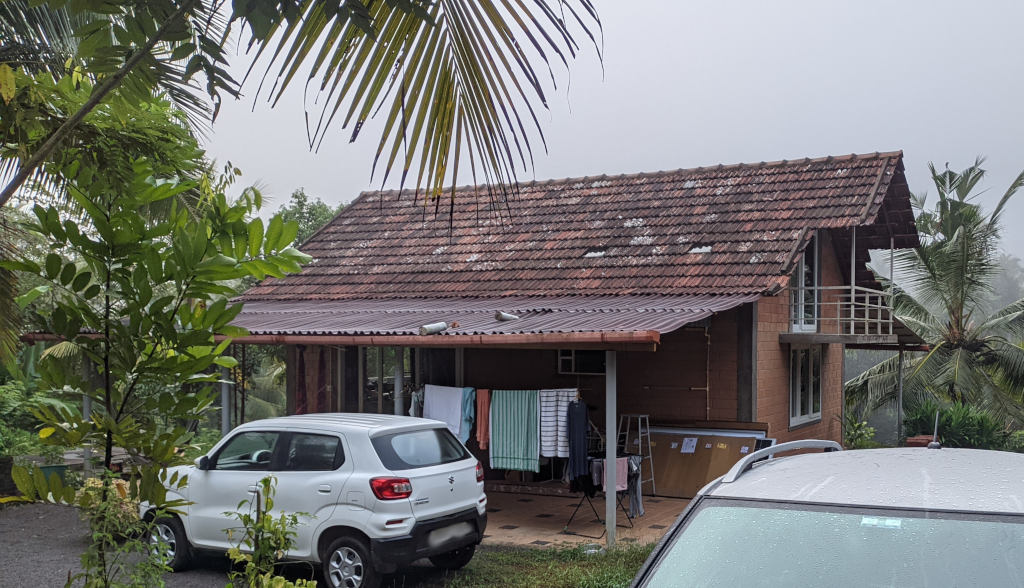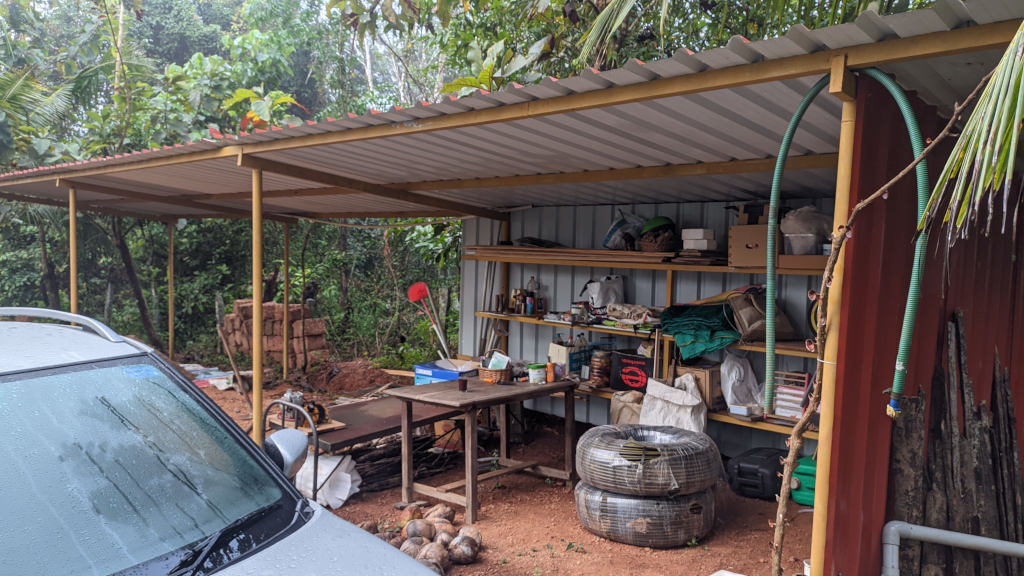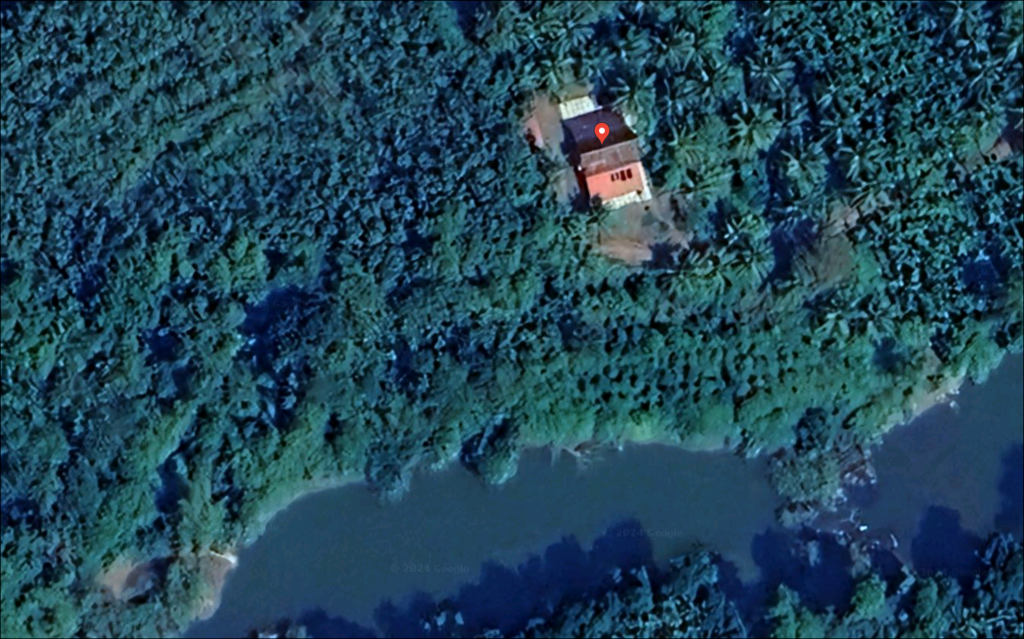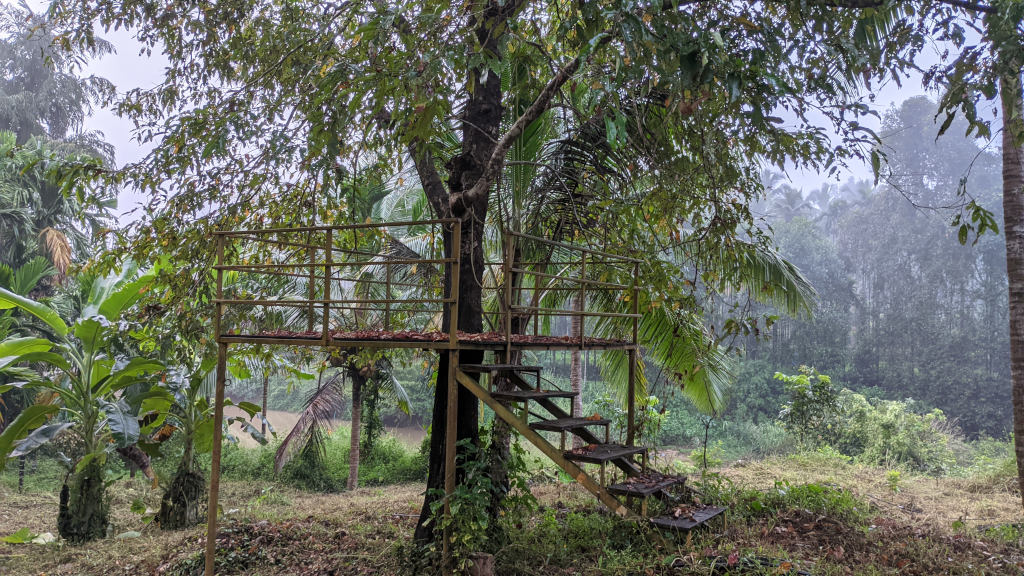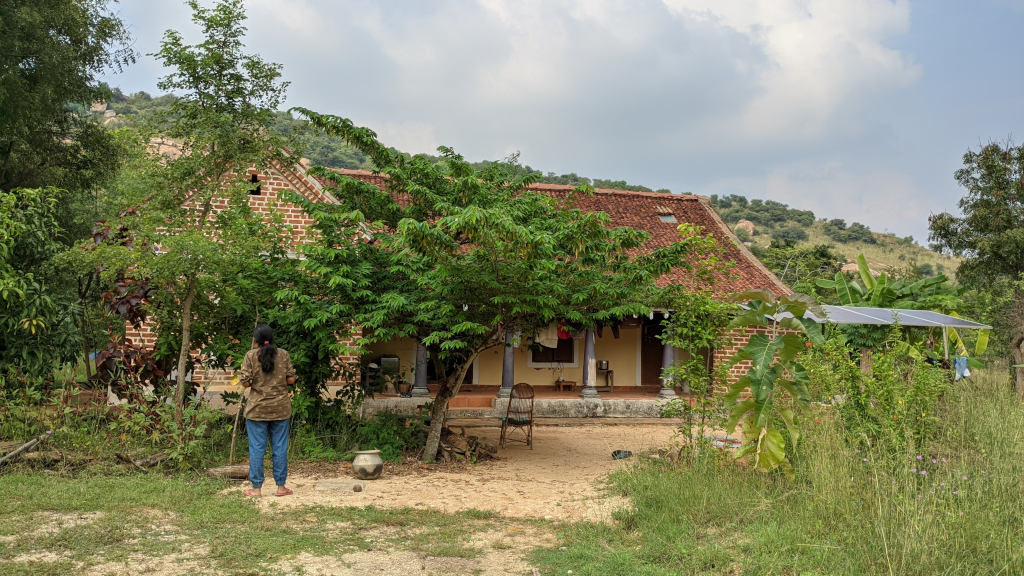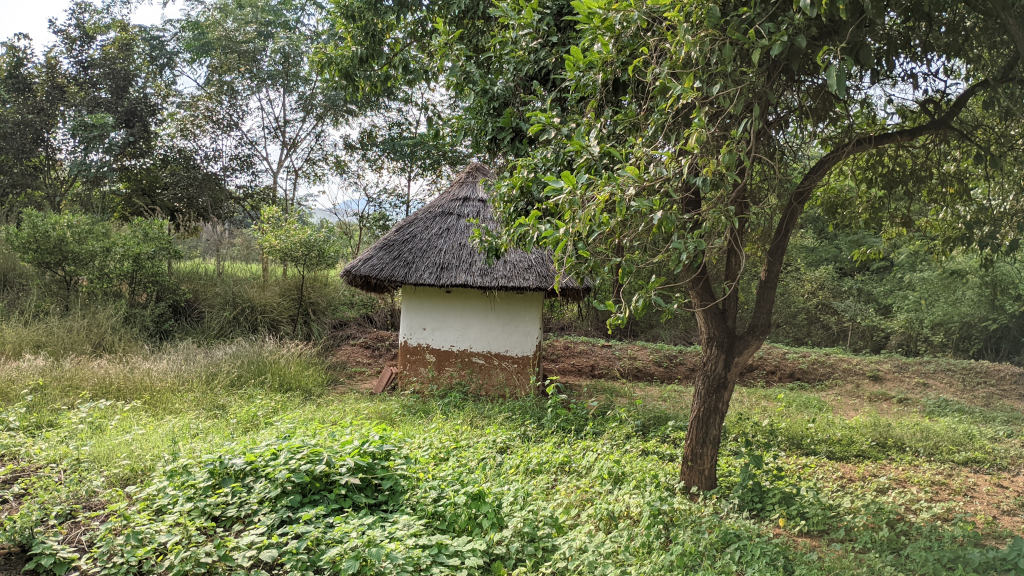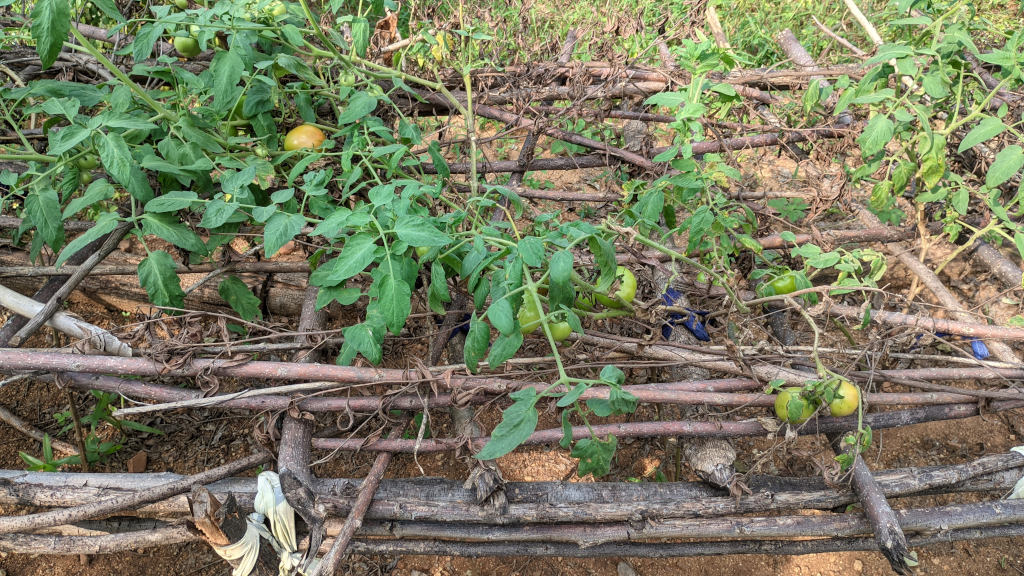Wisdom From Farm Owners
After having decided not to buy a managed farm and also not to buy farm as a group, we finally settled on what we want. Next we thought it would be a good idea to talk to a few owners of farms to get an idea of what we are going to deal with once we own a farm. We know a couple of folks who are unschoolers and also own a farm. We asked them if we could visit their farm and gain some wisdom. Both families graciously agreed and we visited their farms on two separate occasions and spent a lot of time understanding their philosophy, why they were doing farming, what they learned and what difficulties they faced and how they overcame them. We learned a ton, but in this post I summarize some of our learnings.
Family #1
They own a farm that is some 8 hours drive from Bangalore towards western ghats. The nature along the route was beautiful and their place was even more awesome. They live in a small one bedroom house. It is a really tiny house in the middle of some 5 acre farm. The house is made with compressed stabilized earth blocks and the roof is made of Mangalore tiles. They follow sustainable living and tried to use as much of natural material as possible to reduce use of chemicals like cement. From what we understand, the house maintains temperature better than the concrete houses. To reduce waste, they procured and reused Mangalore tiles that were discarded or thrown away from other houses in their neighborhood.
There are many things that are common between our two families including unschooling, sustainable living, minimalism, natural farming, love for electronics, interest in do-it-yourself projects, composting etc. We had a good time. Their farm is right next to a river. You can hear the sound of river flowing and the birds chirping so nicely in the quiet hours of morning. I loved it. They built a shed which houses all kinds of tools related to farming. I remember thinking “I would love to build one like that when we eventually buy a farm to store not only all the farming related tools but also mechanical and electronics related ones”. I could make it into a workshop where I can work on my projects in solitude.
We had so many questions for them. For one, we wanted to know about security. First of all they are living in a semi-remote place. There are a few houses here and there but not at all like in the city. Moreover, they have huge sliding doors without even a lock! Their response was that they don’t have anything expensive in their house for anyone to steal. I found that a very cool and relaxed response. They don’t really have anything expensive indeed. No TV, no surround sound, no tables, chairs, beds (they sleep on floor on a thin mattress), nothing. They do have a couple of laptops and phones though. I did not know what else to say.
Another question we had was how they handle rats, snakes etc. Again a very simple answer. Their suggestion is that these animals rarely come inside the house if they have a place to live outside. So for rats and the like they have a dark cozy place and leave any food remains there. As long and you don’t go near there, it is safe it seems. Or at least that is what their experience says. They mostly cook the vegetables that they grow. For any non-veg items like chicken or eggs, they have to go some ways to get to the nearest village to buy things. They try not to venture into the farm in the night. They stay close to the house and the car is parked close by in case they need to go out somewhere.
There are absolutely no lights anywhere in the farm except for near the house. So it is pitch black in the night and you cannot go anywhere without a torch light or car. They have a mud path from the main road up to their house which goes through the edge of their farm. It will be difficult to get in or out of the farm when it rains heavily. They have a couple of neighbors who are about 10 minutes walk from their place so their kids can play. They don’t own a dog, but a dog comes by once in a while for food. May be that is their protection from wild animals, I am not really sure. But they (including the kids) seem to be pretty chill about it.
They don’t have any electricity connection from a utility company and the whole house runs only on solar panels and a sole battery. So if there is a long spell of rains or cloudy weather for a few days, they run out of power and manage without electricity! While that rarely happens, it does happen. So they are very careful with their gadgets and how much electricity they use. The wiring for the house was done by themselves. All the wires directly connect to the battery. Most equipment works directly from battery. So they have BLDC fans, DC LED lights etc. Their laptops and phone chargers still need AC power, so they also have an inverter which they turn on only when required. And when they turn on the inverter, they charge all AC devices at a time. Even their water heater runs off of DC.
The family’s breadwinner works from home (WFH) because he has the fortunate opportunity to WFH indefinitely. They don’t have internet, but he manages with 4G network from his phone which works as a hotspot. They have a bore from which they get water from. Thankfully there is absolutely no water problem and they can easily pump the water from a high water table up to about 15 feet above ground where they have a small water tank. They are almost fully self sustainable. They don’t depend on anyone (for the most part) for water, electricity, internet, cable, water, food etc. They have everything on the farm.
They have a variety of green tea leaf plants for a healthy drink, some coffee plants for the occasional coffee indulgence and cocoa plants for chocolate drinks when the occasion calls for it. They sell some of the produce like cocoa beans and tea powders to make additional money on the side, but it is not their primary source of income. Forgot to mention, they don’t have cows nor do they purchase milk. So still staying self reliant. They drink green tea and black coffee incase you are wondering. Sometimes they use alternate milks like soy or almond when they feel the need to drink milk. Since there is no TV, the kids entertain themselves by playing outside in the farm, or building things or play board games. Those are all the highlights I can remember about this family.
Family #2
This family was slightly closer to Bangalore and the ride took about 5 hours. They have a pretty big farm too. About 10 acres or so. They are also close to a water source although not a river but a small stream. There is also a lake. This family also has a lot in common with us, but to a larger extreme than us. For one, the parents returned to India after working for several years in the US. Both their kids are US citizens. They took the drastic step of moving directly from the US into a small village while building their farm house and then to the farm house. They, like us are retired and living off their savings and don’t work for money anymore.
They unschooled their children, are extreme minimalists and strict followers of self sustainability. Don’t own a car or even a proper two wheeler. They only have a small TVS 150 and use it only to get to the nearest village. For all other travel, they just walk, or take a bus or train. They don’t have TV or any electronics except for one laptop which the whole family shares and their cell phones. Like the previous family, they don’t have electricity from a utility company and rely fully on solar panels. Almost all their electric equipments work off of 24V DC power. Yes they have a larger battery system and bigger solar panels, so they are never actually worried about power loss even during several cloudy days.
Their power consumption is also extremely low in their small 2 bedroom house. Just 3 BLDC fans and a few LED lights, one laptop and 4 cell phones. That’s it. So I am sure their battery system will last them 10 days easily on cloudy days. The best part is that they built the whole solar panel setup, batteries, inverters, electric wiring inside the house including the solar panel stands all by themselves! They even built their own chairs, benches etc with the help of their daughter who is into woodwork. Extreme DIY guys.
The house is built with sun-dried adobe bricks instead of burnt bricks. They got their brick made on site with the mud from their farm. Used mud mortar instead of cement. For roofing they mostly used discarded tiles. They went with natural wood work. The kids built a small hut all by themselves. Like the previous family, their concept is also the same - not to own expensive things so there is nothing to steal form them. They don’t venture out in the dark after sunset. Mostly cook with vegetables grown in their garden. When we visited, they were preparing a paddy field to grow rice. They have grown black rice earlier.
Their bathroom is the strangest of all. They don’t have the usual wet toilet. It is a dry toilet, where, what you excrete does not go into a septic tank but instead just drops into a hole below the toilet where it is covered with saw dust and left to compost. After several months of composting, they use the manure for their crop. Even the urine is collected and used for nitrogen. So nothing goes to waste and they don’t have a need for landfills. You can read all about it and a lot more on their blog. Like I said, they are pretty extreme in everything they do!
While they don’t do any rearing of animals, they do have pet hens. A stray dog visits their house for food and shelter. A local farmer lets his cows graze in their farm where there are weeds and grass. They have a bore well and a pump that runs on DC power that fills up an overhead tank. If I remember correctly, they have a 2KW solar panel setup and four 150 AH lead acid batteries in series and parallel connection for a 24V system.
We asked them lots of questions about farming, unschooling, sustainable living and minimalism. They gave us a lot of advice and wisdom. One of the advice that stood out was that we should not be in a hurry and instead do things at a slow pace. Don’t think that once you own a land you have to improve it and make it green with trees instantly and prove something. The land was there before you were born and will continue to exist after your are long gone. Let it grown naturally and slowly. Another advice was that in hindsight they should not have gone with wooden furniture, windows etc. Perhaps should not have gone too extreme on using natural material. At the time we visited, they were fighting a termite battle that ate good part of the wood and a bunch of their books. So perhaps a mix of modern (but recyclable) and natural building materials might have been better.
When asked about dangerous animals, they had similar response like the previous family. No animal attacks you until you threaten it, so be mindful when walking and exploring their habitat. They mentioned that snakes do visit their house and the kids have become experts at catching them with bare hands and leaving them outside. They mentioned it so casually as if it is not worth any concern :)! They warned us that there will be some initial hurdle with neighbors because we are city folk living among the locals. So initially the locals might cause some trouble because for them you are non-locals. After learning their language and helping them and their kids, the locals became more favorable but still maintain a watchful eye.
Those were all the important things I could remember. We visited these families a long time ago before purchasing our own farm. So I am not able to recall all the interesting facts. We visited a few more farm owners who were not from the unschooling group and sought their advice too. Some of the advice overlaps with these families and some doesn’t. We felt more aligned with those two families and hence I wrote mostly about them. Moreover, we spent a lot of time with them than with other farm owners. There is always some bias involved.


